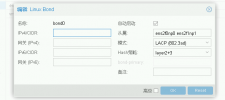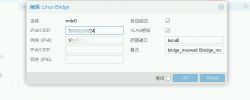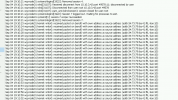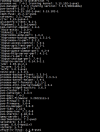root@mox01:~# uptime
10:48:43 up 1:34, 1 user, load average: 0.00, 0.00, 0.00
root@mox01:~# apt list --installed ifupdown2
Listing... Done
ifupdown2/stable,now 3.2.0-1+pmx4 all [installed,upgradable to: 3.2.0-1+pmx5]
root@mox01:~# cat /proc/net/bonding/bond0
Ethernet Channel Bonding Driver: v6.2.16-19-pve
Bonding Mode: adaptive load balancing
Primary Slave: None
Currently Active Slave: eno1np0
MII Status: up
MII Polling Interval (ms): 100
Up Delay (ms): 0
Down Delay (ms): 0
Peer Notification Delay (ms): 0
Slave Interface: eno1np0
MII Status: up
Speed: 10000 Mbps
Duplex: full
Link Failure Count: 0
Permanent HW addr: 98:03:9b:b0:af:8e
Slave queue ID: 0
Slave Interface: ens4f0np0
MII Status: up
Speed: 10000 Mbps
Duplex: full
Link Failure Count: 0
Permanent HW addr: b8:59:9f:05:a7:a8
Slave queue ID: 0
root@mox01:~# ip link
[...]
2: eno1np0: <BROADCAST,MULTICAST,SLAVE,UP,LOWER_UP> mtu 9000 qdisc mq master bond0 state UP mode DEFAULT group default qlen 1000
link/ether e6:17:57:7f:a1:9d brd ff:ff:ff:ff:ff:ff permaddr 98:03:9b:b0:af:8e
[...]
4: ens4f0np0: <BROADCAST,MULTICAST,SLAVE,UP,LOWER_UP> mtu 9000 qdisc mq master bond0 state UP mode DEFAULT group default qlen 1000
link/ether b8:59:9f:05:a7:a8 brd ff:ff:ff:ff:ff:ff
[...]
8: bond0: <BROADCAST,MULTICAST,MASTER,UP,LOWER_UP> mtu 9000 qdisc noqueue master vmbr0 state UP mode DEFAULT group default qlen 1000
link/ether e6:17:57:7f:a1:9d brd ff:ff:ff:ff:ff:ff
9: vmbr0: <BROADCAST,MULTICAST,UP,LOWER_UP> mtu 9000 qdisc noqueue state UP mode DEFAULT group default qlen 1000
link/ether e6:17:57:7f:a1:9d brd ff:ff:ff:ff:ff:ff
[...]
root@mox01:~# ifreload -a
root@mox01:~# ip link
[...]
2: eno1np0: <BROADCAST,MULTICAST,SLAVE,UP,LOWER_UP> mtu 9000 qdisc mq master bond0 state UP mode DEFAULT group default qlen 1000
link/ether 98:03:9b:b0:af:8e brd ff:ff:ff:ff:ff:ff
[...]
4: ens4f0np0: <BROADCAST,MULTICAST,SLAVE,UP,LOWER_UP> mtu 9000 qdisc mq master bond0 state UP mode DEFAULT group default qlen 1000
link/ether b8:59:9f:05:a7:a8 brd ff:ff:ff:ff:ff:ff
[...]
8: bond0: <BROADCAST,MULTICAST,MASTER,UP,LOWER_UP> mtu 9000 qdisc noqueue master vmbr0 state UP mode DEFAULT group default qlen 1000
link/ether 98:03:9b:b0:af:8e brd ff:ff:ff:ff:ff:ff
9: vmbr0: <BROADCAST,MULTICAST,UP,LOWER_UP> mtu 9000 qdisc noqueue state UP mode DEFAULT group default qlen 1000
link/ether 98:03:9b:b0:af:8e brd ff:ff:ff:ff:ff:ff
[...]





